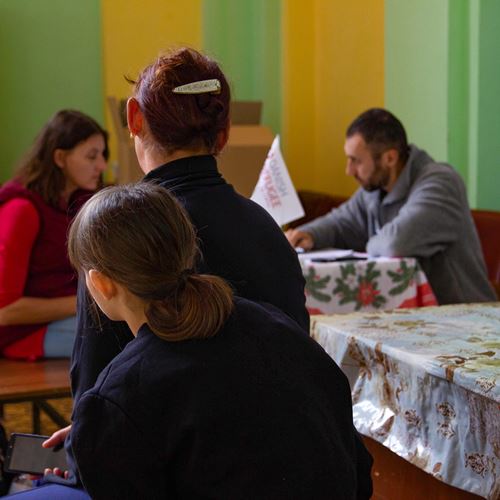The war in Ukraine continues to cause large-scale displacement. Millions of people move internally or abroad trying to find a safe place to live. They often bring little or nothing with them. It is, unfortunately, a common situation when a family is forced to flee their home that there is no room or time to take other than a few necessities. To better cope and to start their lives from scratch in a new location far from home, they need support on many levels, not least financially. Immediately after the crisis erupted in February 2022, DRC — through the Ukraine Humanitarian Fund — has provided over 4,000 people with cash grants — an activity that is now being scaled up to help more people in need.
Read three stories on why such support is essential and what difference it made to the people who received emergency cash assistance.
Surviving in the subway: Olena* had to flee home twice since 2014
Eight years ago, Olena, 34, fled Donetsk city, now a non-government-controlled area, and settled in Kharkiv which is a government-controlled area, due to the outbreak of conflict in eastern Ukraine. After the massive bombings in February 2022, Olena with her husband and two children, 2 and 8, had no other option than to live in a Kharkiv subway station for two weeks.
"The metro station was full of people ‒ about 1,500 persons with children and pets. Everyone thought this horror would end in a few days, but weeks passed, and the children started to get sick. It was cold there, and with so many people in enclosed space, the viruses spread quickly," says Olena.
Shelling became more intense. Olena and her family escaped to Ternopil Oblast in western Ukraine. As displacement within Ukraine is massive, it is a challenge to find a place to stay in western Ukraine. Olena and her family were lucky to find a village summer house.
"The government payments for people who are displaced in Ukraine (around €75) were issued three months after the application. We took only essentials from Kharkiv and had no summer clothes. My husband lost his job, I am a mother on maternity leave — and we are short on money," she adds.
For a DRC grant (UAH 40,900 / €1,020) — Olena bought groceries, summer clothes, and partially covered utility bills. In addition, the grant helped to buy stationery for the children and connect a house to the Internet to find not least critical and updated information, but also for the children to continue their daily lives. Due to martial law, many schoolchildren in Ukraine study online and the availability of the Internet is a key requirement for attending classes.
Kateryna* saved four children from bombings
The settlement where Kateryna, 35, lived was one of the first to be hit by rocket attacks in February 2022. Her car and the apartment, where she lived with her husband and 4 children, were damaged.
“I had to take loans to take the children from Zhytomyr Oblast and move to western Ukraine,” says Kateryna.
They moved to Mukachevo city in Zakarpattia and rented an apartment for UAH 10,000 (€250) per month. It was difficult for them to find an apartment, rents have spiked, and the number of temporary shelters for the internally displaced is limited. Moreover, many interim city shelters are going to be closed and people must find other places to stay.
The DRC grant of 54,000 UAH (€1,350) was enough to partially repay a loan taken to flee and buy medicine for the children. The money also helped prepare children for school. "We bought stationary for them and other stuff so they could start studying. It was also enough to pay for the apartment rent".
Pregnant Sofia* had to evacuate from her home city in eastern Ukraine
Sofia, 21, and her boyfriend left Kramatorsk, a city in eastern Ukraine, on one of the first evacuation trains. Her apartment in Kramatorsk has no windows. They were blown out by the blast wave.
At first, they lived in a temporary shelter for internally displaced people, but the local administration warned them that they had to leave in a week for their security. They moved to a dormitory for students, where they lived for several months. It was hard for pregnant Sofia to cope with the constant moving and so they started renting an apartment. Due to the high demand, apartment rental prices in the city had doubled.
The grant from the DRC — UAH 34,200 (855 euros) — helped to cover basic needs. "We bought winter clothes. Part of the sum was spent on rent. We were also able to buy the goods for the newborn, for instance, a baby carriage".
For now, Sofia and her boyfriend live in Odesa, a big city in the south of Ukraine. Due to hostilities, renting apartments here is cheaper. In addition, her boyfriend found a job there.
"We plan to be in Odesa until Spring, but then we want to return to home in Kramatorsk. I hope we will have the opportunity to return," says Sofia.
*Names changed for confidentiality purposes.
